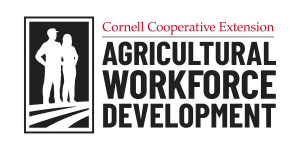On April 5th, three Cornell programs (Small Farms, Ag Workforce Development, and Dairy Foods Extension) jointly hosted a webinar for employers who are interested in hiring asylees into agriculture and food manufacturing jobs. Find the webinar recording here.
Chris White, deputy commissioner for workforce development for the NY State Department of Labor was our first speaker. He shared the services that are available from various state agencies and a demographic profile of the asylum seekers, and some opportunities and barriers to employment. Many resources, including a form for interested employers to indicate their interest in asylum seekers can be found at the NYSDOL website.
In addition to Chris White, we were also joined on the webinar by two employers who have current experience with refugees and asylum seekers: Jeannette Kreher Heberling is a 4th generation partner in Kreher Family Farms, and Allison Bolet Cafaro is the generational impact manager for Great Lakes Cheese. Jeanette and Allison shared their experiences working with employees from different cultures and language backgrounds, and the successes they have experienced with the new employees and supportive community groups. They also shared the real and practical challenges, such as local transportation, that come with hiring refugees or asylum seekers in rural communities.
I wanted to draw attention to another resource, Cornell Small Farms program developed a resource website for Asylum Seekers & New Americans in New York Agriculture.
By Richard Stup, Cornell University. Permission granted to repost, quote, and reprint with author attribution. The post Hiring Asylees into Agriculture and Food Manufacturing Jobs appeared in The Ag Workforce Journal.


